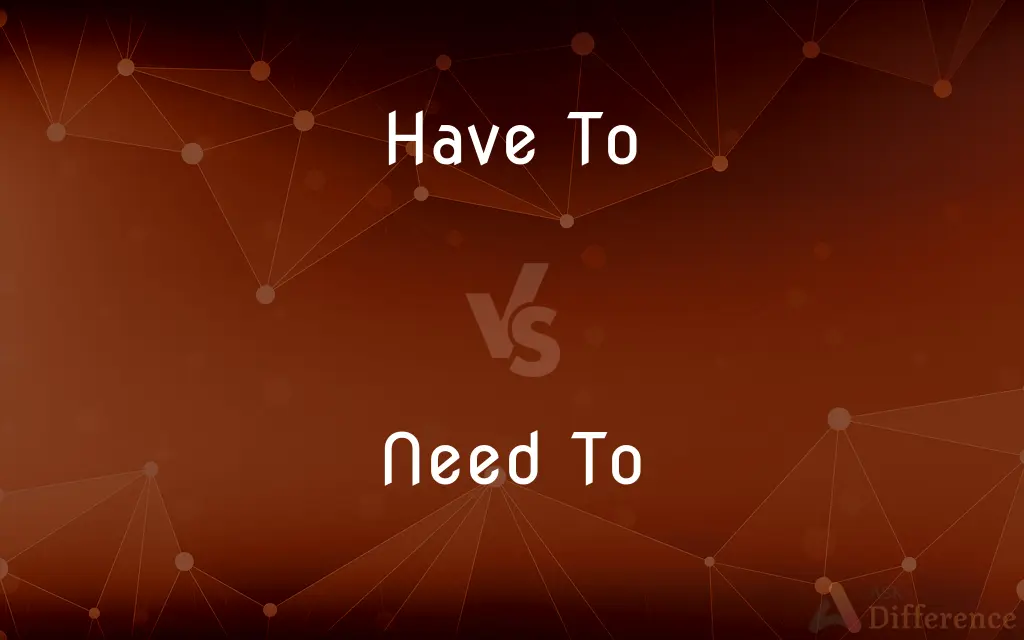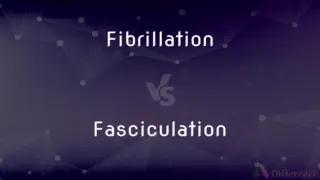Have To vs. Need To — What's the Difference?
By Tayyaba Rehman — Published on November 25, 2023
Have To" generally implies a requirement or obligation, while "Need To" typically expresses a necessity or essential action, both used to indicate that something is mandatory.

Difference Between Have To and Need To
Table of Contents
ADVERTISEMENT
Key Differences
"Have To" most commonly implies an external obligation, suggesting that there are external forces or rules necessitating an action. "Need To" can present a somewhat different nuance, often implying a personal or internal requirement or something essential for achieving a certain goal.
"Have To" might be more frequently employed in contexts where rules, laws, or authoritative demands dictate the necessity of an action. Contrarily, "Need To" might more often be seen in situations where the imperative arises more from personal wants, goals, or situational demands, rather than dictated obligations.
Usage of "Have To" might be perceived as somewhat stronger or more imperative in certain contexts, indicating that there is no room for negotiation regarding the action being required. In contrast, while "Need To" can still convey urgency or necessity, it might sometimes be seen as slightly less forceful or imperious than "Have To."
"Have To" is also utilized in everyday communication to express inevitability or something that is expected to happen due to certain rules or established patterns. Meanwhile, "Need To" might also appear in general communication but may carry a nuance that implies the necessity arises due to a desire to avoid negative outcomes or to fulfill personal objectives.
In certain expressions or contexts, "Have To" and "Need To" can often be used interchangeably without dramatically altering the meaning of a sentence. However, subtle nuances between them can convey slightly different implications regarding the source or nature of the imperative, with "Have To" potentially being more external and "Need To" being perhaps more internal.
ADVERTISEMENT
Comparison Chart
Connotation
Often implies external obligation
May imply personal necessity
Forcefulness
Can be slightly more imperative
Might be slightly less forceful
Common Usage
Dictated obligations
Essential for personal goals
Interchangeability
Can sometimes be swapped
Sometimes swap with "Have To"
Flexibility in Usage
Might be rigid in meaning
Might have more flexible use
Compare with Definitions
Have To
Points to urgent requirements.
They have to complete the project by Monday.
Need To
Expresses an essential condition.
You need to study to pass the exam.
Have To
Expresses a binding obligation.
You have to wear a helmet when riding a bike.
Need To
Highlights a personal necessity.
I need to eat to gain energy.
Have To
Implies societal or legal norms.
I have to pay taxes every year.
Need To
Implies crucial actions for desires.
We need to save money to buy a new car.
Have To
Indicates inevitable circumstances.
We have to leave early to catch the train.
Need To
Signifies an importance.
They need to listen carefully to follow instructions.
Have To
Signifies established rules.
You have to be 18 to vote in the election.
Need To
Indicates an act to prevent consequences.
She needs to apologize to mend their friendship.
Common Curiosities
Is "Have To" always more forceful than "Need To?"
Not always, but it can sometimes come across as slightly more imperative.
Is "Need To" used for urgent situations?
Yes, "Need To" can express urgency, especially related to personal necessities.
Can "Need To" imply an external obligation?
Yes, but it often leans towards a personal necessity or goal.
Can “Have To” be used to describe future obligations?
Yes, "Have To" can describe future obligations, e.g., “You have to attend tomorrow’s meeting.”
How do “Have To” and “Need To” function in questions?
They can formulate questions about obligations or necessities, e.g., “Do I have to?” or “Do I need to?”
Can “Need To” suggest a lack or a deficiency of something?
Yes, "Need To" might imply that something is lacking or insufficient and thus necessary.
Can “Need To” denote a requirement for achieving something?
Yes, "Need To" can highlight a requisite action for accomplishment, e.g., “You need to run faster to win.”
Can "Have To" imply a personal obligation?
Yes, "Have To" can imply personal obligation but often suggests external factors.
Can "Have To" and "Need To" be used interchangeably?
Often, but subtle differences might change the sentence's nuance.
How does negation work with “Have To” and “Need To”?
Typically, “don’t have to” implies no obligation, while “don’t need to” implies no necessity.
Is “Have To” often used in legal or official contexts?
Yes, "Have To" is frequently utilized to denote legal obligations or official rules.
Are “Have To” and “Need To” formal expressions?
Both can be used in formal and informal contexts, but alternative phrases might be preferred in very formal writing.
Is “Need To” associated more with personal desires?
Yes, "Need To" often implies a personal imperative or something essential for achieving an individual’s goal.
Is “Have To” used to describe both present and past obligations?
Yes, though for past obligations, “had to” is used, e.g., “I had to finish my work.”
How are “Have To” and “Need To” employed in negative sentences?
Both can be used with "do not" (don’t) to form negatives: “don’t have to” or “don’t need to.”
Share Your Discovery

Previous Comparison
Fibrillation vs. Fasciculation
Next Comparison
Earth 1 vs. Earth 2Author Spotlight
Written by
Tayyaba RehmanTayyaba Rehman is a distinguished writer, currently serving as a primary contributor to askdifference.com. As a researcher in semantics and etymology, Tayyaba's passion for the complexity of languages and their distinctions has found a perfect home on the platform. Tayyaba delves into the intricacies of language, distinguishing between commonly confused words and phrases, thereby providing clarity for readers worldwide.














































